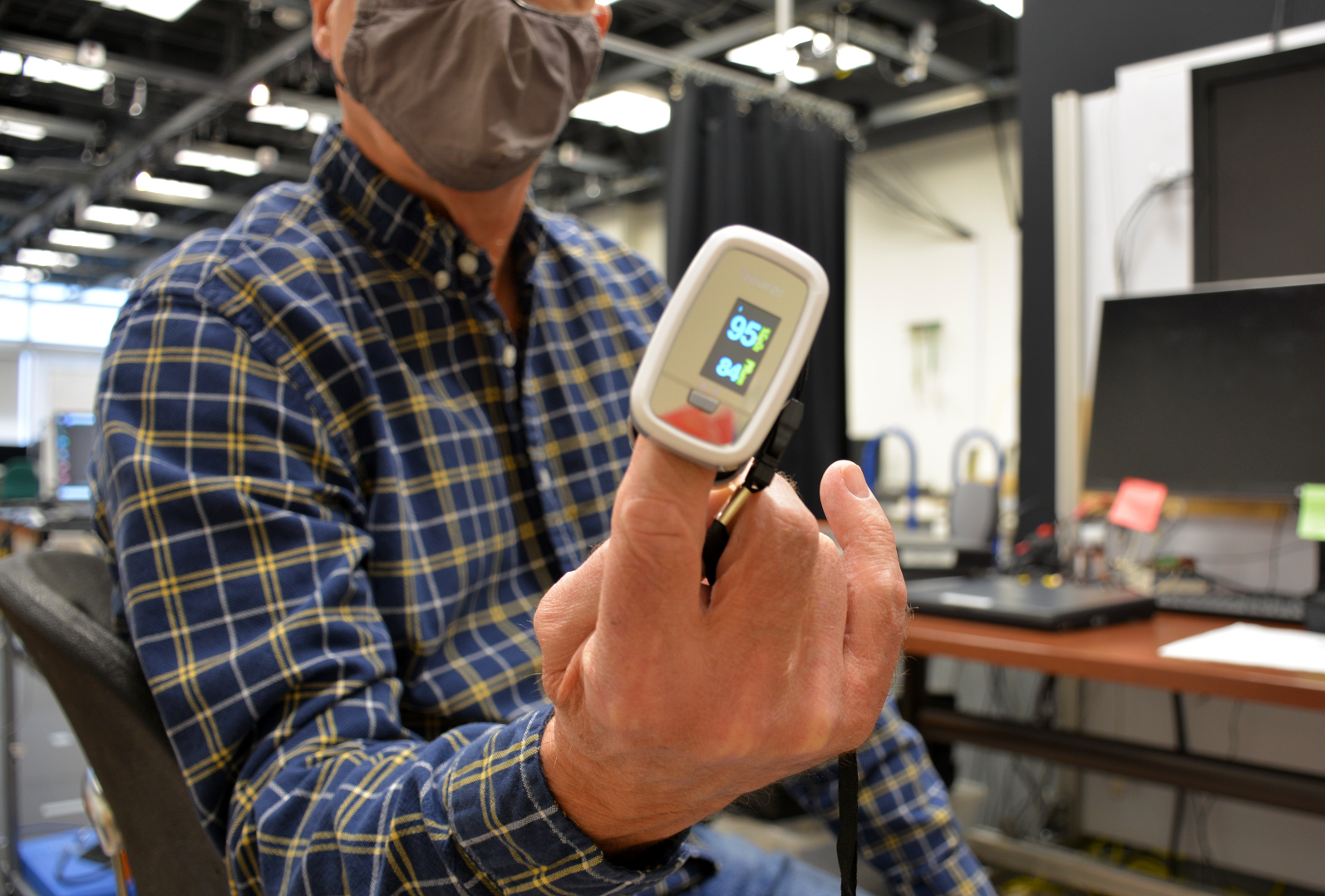Rural long-COVID patients to be monitored remotely during ProMote system trial
Jon Pullin - 20 July 2023

A ProMote device monitors a patient's heart rate.
When it comes to patient assessment and monitoring for people living in rural areas, distance can be a problem.
It can often mean a long drive into the big city, time off work, a hotel stay, fuel costs and other expenses.
With the rise of long COVID, research coordinator Emily Armstrong and her team were asked by Alberta Health Services (AHS) Allied Health to see if they could support virtually assessing rural patients for different respiratory complications.
The ProMote virtual care study builds on Tele-Rehab 2.0, a remote assessment research project out of the Rehabilitation Robotics Lab in the Faculty of Rehabilitation Medicine under Martin Ferguson-Pell.
The study looks at both the technology itself and the process of getting patients to local clinics. It also evaluates both patient and clinician experiences with the system.
Rural patients with long COVID visit their local health clinic. There, with the help and supervision of a local clinician, they connect with an expert in Edmonton through the ProMote system.
“Local supervision is important as we do a lot of tests that could be dangerous to do alone, like balance tests,” says Armstrong. The local clinician also helps run the technology.
Measurement devices used in patient assessments include a respiration belt and e-stethoscope, as well as the standard ProMote system, which uses markerless motion capture and a telepresence robot, a remote-controlled, wheeled device that has wireless internet connectivity.
“The e-stethoscope is similar to a regular stethoscope, except the part that goes on your chest is a microphone. This lets us transmit the heart and lung sounds to the expert clinician so they can determine if anything is concerning,” says Armstrong.
The respiratory bands stretch to record how much a patient’s lungs expand while breathing. It measures breathing rate and depth of breath. The data is transmitted to an app on a device and is then live-streamed to the expert clinician for monitoring.
The wireless respiration sensor was developed in collaboration with Sensoria Heath, a health-care technology company based in Redmond, Washington, to monitor chest and diaphragmatic breathing patterns simultaneously.
One of the primary motivators for the project is the team’s desire for equity.
“We have equality in our health-care system, in that everyone can get the same care, but we don’t have equity, as some people can access that care a lot more easily than others,” says Armstrong. “Giving rural communities better access to specialized care removes one of the biggest barriers to seeking and receiving care: travel.”
“We calculated that rural patients pay an extra $450 to travel to Edmonton for each specialist appointment. That’s out of pocket and based solely on where they live.”
The project is currently being tested at 18 sites across the province.
From their initial small pilot, the team saw a significant improvement in patient conditions and very positive responses from both patients and clinicians. Armstrong says that hiccups with the technology decreased over time, and even when there were problems everyone still felt very positively about the program and the access it was providing.
“We’re currently analyzing the experiences of more than 65 patients and we’re hoping for more positive results. We then hope to present our case to AHS to make this a permanent program in as many rural communities as possible,” says Armstrong.
“AHS has been a great partner on this project and the members of their Allied Health team have been terrific advocates for us.”
Rural Albertans experiencing mild long COVID symptoms can safely and effectively manage their symptoms through their community clinic, through Health Link, or virtually through ProMote. AHS also has several web/phone-based options for both patients and providers to support and manage long COVID symptoms that can be found by visiting:
For providers:
- Rehabilitation Advice Line at 1-833-379-0563 to speak with a physiotherapist or
occupational therapist. - Recovery and Rehabilitation After COVID-19: Resources for Health Professionals
https://www.albertahealthservices.ca/topics/Page17540.aspx - Information for Community Physicians
https://www.albertahealthservices.ca/topics/Page16956.aspx
For patients:
- Rehabilitation Advice Line at 1-833-379-0563 to speak with a physiotherapist or
occupational therapist. - Getting Healthy after COVID-19: Resources for Patients
https://www.albertahealthservices.ca/topics/Page17397.aspx - After COVID: Information and resources to help you recover
https://myhealth.alberta.ca/HealthTopics/After-COVID